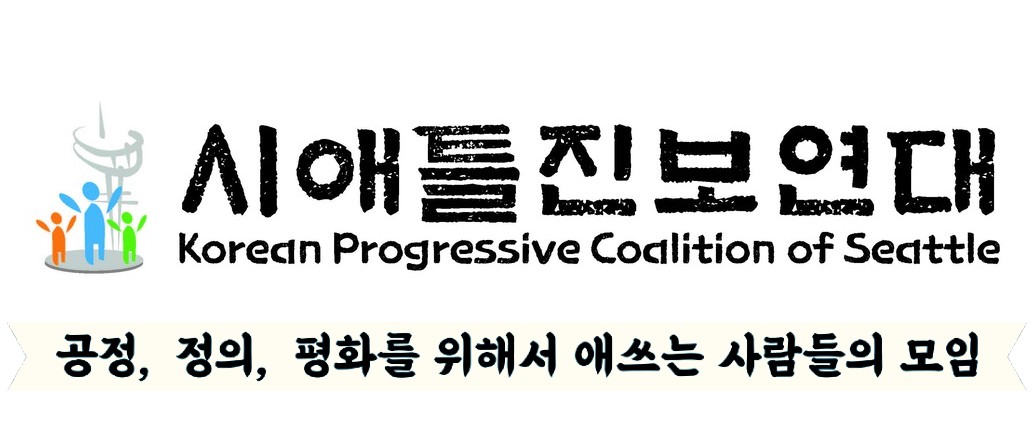바이든 행정부가 북한과 중국에 대한 “억제 및 협력 강화”를 명분으로, 워싱턴이 오랫동안 추구해 온 일본과 한국과의 군사 동맹을 공식화하기로 결정했다. 미국의 핵 자산이 한반도에 배치되고, 중국을 둘러싸는 미국의 꾸준한 군사 포위 중에, 8월 18일 첫 번째 한미일 정상회담이 캠프 데이비드에서 열렸다.
이 때를 맞추어 Axis of War: The Japan-Korea-US (JAKUS) Trilateral Alliance <전쟁의 축: 한미일 삼각 군사 동맹> 라는 제목의 웨비나(온라인 세미나)가 미 서부시간으로 8월 18일 오후 4시에 열렸다.
웨비나에서는 이 위험한 삼자 군사동맹의 역사적, 지정학적 맥락을 살펴보았다.
웨비나 패널에는 탐사 전문기자 팀쇼락, 코네티컷 대학교 역사학과 교수 알렉시스 더든, Korea Peace Now의 평화 통일 운동가 Cathi Choi가 참가했다. 한국정책연구소의 시몬천 박사가 웨비나 진행을 맡았다.
줌으로 진행된 웨비나는 유튜브로 생중계되었으며, 강은지 전문통역사에 의해 한국어로 동시통역되었다.
The summary of Tim Shorrock’s talk:
Biden & Blinken’s “new” trilateral alliance with Seoul and Tokyo.
1. Washington has been encouraging Japanese rearmament and the merging of Japanese and Korean strategic interests since the first years of the U.S. military occupation of Southern Korea from 1945 to 1948.
2. US officials began seriously pressing for Japanese involvement in Korea during the Vietnam War, particularly after South Korea and Japan – under intense US pressure – signed a 1965 treaty normalizing their ties for the first time since World War II.
3. During the Obama administration, U.S. officials (like Blinken) tried to create an alliance with Tokyo and Seoul by encouraging the two countries to end their long-running dispute over Imperial Japan’s cruel exploitation of Korean sex slaves known as “comfort women.”
4. But during the presidency of Moon Jae-in, a former dissident who championed engagement with North Korea over military confrontation, the idea was flatly rejected. Biden, during his campaign, called the Moon strategy of detente with the DPRK “appeasement.”
5. Seoul-Tokyo relations deteriorated after Japan’s Abe government imposed export controls in South Korea in retaliation for a court decision that allowed Korean citizens to sue Japanese corporations for using Korean forced labor during World War II.
6. Everything changed when Biden came to office in 2021 and Yoon, a right-wing militarist sympathetic to Japan, was elected to succeed Moon as president in 2022. Yoon let Japan off the hook. Both men embraced the idea of Japan playing a much greater role in military operations.
7. Yoon’s agreement with Kishida on forced labor was a complete sham and has been denounced in South Korea. But Biden and Blinken, true to form, praised it as an act of great statesmanship.
8. All of this is spelled out in these detailed articles on my website. – Biden Introduces a New Trilateral Alliance with South Korea and Japan that Could Keep US Troops in Asia Forever – Japan Crosses the Rubicon – The Rise of Japan’s Self-Defense Forces
https://timshorrock.com/2023/
The summary of Cathi Choi’s talk:
WCDMZ/KPNGN Intro
-
Activists at Women Cross DMZ and KPN have been fighting for change on multiple fronts
-
In 2015, Women Cross DMZ organized a delegation of 30 international women peacemakers to cross the DMZ from North to South Korea to call for an end to this ongoing war
-
A few years later, Women Cross DMZ joined forces with 4 other women’s peace organizations based in South Korea to lead the campaign called Korea Peace Now.
-
We inherit a long history of organizing
-
We’re not reinventing the wheel
-
We’re inheriting a long history of diasporic Koreans and international coalitions organizing for peace on the Korean peninsula
-
These elders and those who came before show us that Internationalism is absolutely an essential thread in progressive movement building
-
Here we see on the left a group of international women who organized to visit the Korean peninsula during the war-
-
As US military forces engaged in air bombing campaign, leveling entire cities the North, Pres Truman announced considering using atomic bomb
-
Park Chong-ae, the chair of the Korean Democratic Women’s Union, and Korean feminist activist Ho Chong-suk, asked the Women’s International Democratic Federation to send representatives
-
A group of 21 women arrived in 1951
-
In their report to the UN, they raised alarms about the devastation of the Korean War and publicized the US atrocities
-
-
Diamond Kimm
-
Korean independence activist organizing from Los Angeles for Korean independence from Japanese colonial rule and later on for Korean freedom from US military occupation
-
Diamond Kimm fought against Communist hunting all the way thru the supreme court
-
-
Shows how important it is for international actors to use their voice, in their relative positions of power, while working in concert with activists on the peninsula
Organizing tools we have at our disposal
-
Grassroots organizing: Korea Peace Now Grassroots Network
-
Realizing the U.S. posed the main obstacle to peace – Korea Peace Now activists formed a U.S.-based grassroots network in order to organize for change in U.S. policy.
-
Together, our grassroots network now encompasses over a dozen chapters with hundreds of members across the nation.
-
-
Legislative Advocacy Efforts: In our advocacy efforts, we organize around the Peace on the Korean Peninsula Act
-
We use this tool to translate grassroots energy into building political will
-
We’ve seen major gains over the years
-
Over 10 years ago, when this bill was first introduced- the first of its kind calling for a peace agreement, we could only get 2 members of Congress to support
-
Now we have over 30 co-sponsors
-
Every year we organize Advocacy Week through which we rally constituents to meet with their congressional representatives to lobby them to co-sponsor PKPA
-
As a result of our latest Advocacy Week, we’ve gained 5 new co-sponsors
-
We use this bill as a tool not only to harness people power to force the issue with their representatives, but also as a platform to educate congressional representatives and their aides – many of whom do not know basic things about the Korean War
-
Storytelling is a fight for our future
-
We recently gathered in Washington DC – over 500 individuals from all generations for a three-day national mobilization to call for a peace agreement
-
[more on DC mobilization here]
-
Also discuss the Korea Peace Appeal Summit in Seoul
-
-
We also change the narrative through cultural organizing and political education
-
We draw the throughlines between this movement and other movements transnationally
-
Deann Borshay Liem’s telling of the 2015 DMZ Crossing is have its world premiere on World News Channel this July 23 to coincide with the 70th anniversary of the armistice
-
We are organizing screenings across the country and are hoping this can create mass dialogue and change in discourse around Korea
-
-
Additionally, we have our grassroots members engage in community political education
-
Tony Cho, UCSD – on environmental justice and military bases
-
Yoon Ra, filmmaker about Red Canary Song on intergenerational cultural organizing with their own grandfather based on S Korea
-
Joseph Han, author of Nuclear family, wrote moving, powerful testimony about the impact of the Korean War on militarization in Hawai’i
-
-
-
At the policy level, we’ve released multiple educational reports: on sanctions, US-China relations, Peace Agreement
-
We’ve seen the direct benefits
-
As a result of our sanctions report, Tomás Ojea Quintana, the former UN Special Rapporteur for the DPRK, came out in support of our movement and called for a peace agreement
-
(출처 JNC TV를 밝혀 주실 경우 자유롭게 인용 보도 하실수 있습니다.)










